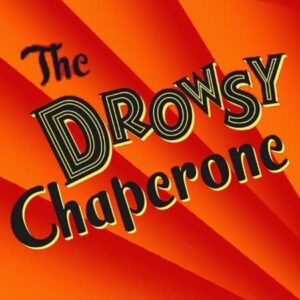The Greeneville Theatre Guild announces auditions for their summer musical production of “The Drowsy Chaperone”!
Auditions will be held on March 24 & 25 at 6:00 pm at the Theatre Depot building at 248 W. Depot Street. Callbacks will be held on Wednesday, March 26, if needed.
Auditions will consist of cold readings from the script, stage movement exercises, and selections from the musical numbers “I Don’t Wanna Show Off” and “Cold Feets.”
Production dates are June 20, 21, 27, 28 at 7:00 pm and June 22 and 29 at 2:00 pm at the Capitol Theatre.
Rehearsals will predominantly be held on Monday, Tuesday, and Thursday evenings, with the possibility of a couple of Sunday afternoon rehearsals.
Please bring a list of any conflicts with you to the audition.
Co-directors Frank and Paige Mengel, music director Kasie Shelnutt, and choreographers Christa DelSorbo and Sara Claiborne will be looking for actors to fill the following roles:
Man in Chair: an anti-social Broadway musical fan. A bit mousy. PLEASE NOTE: This character serves as the narrator and is in every scene except the brief scene just after intermission. It will require significant rehearsal and memorization time.
Janet Van de Graaff: Star of Feldzieg’s Follies who is conflicted about giving up her life on the stage to marry Robert Martin. Attractive, vivacious, outgoing personality. She loves being the center of attention and is the consummate 1920s starlet. Strong movement and special skills (acrobatics, juggling, etc.) a plus.
Robert Martin: The groom-to-be who is deeply in love with Janet. He is the token 1920s leading man – debonair, dashing, and a matinee idol. He is cheesy, cheerful, and optimistic. Ability to roller skate is a plus.
The Drowsy Chaperone: Janet’s alcoholic confidante. Care-free, often because she is drunk. An experienced “woman of the world” who couldn’t care less what the world thinks. A melodramatic diva to be reckoned with who gleefully “chews the scenery” and steals just about every scene she is in.
Aldolpho: Latin womanizing cad who is very impressed with himself. He is a confident buffoon. Vaudeville-style acting and fake Spanish/Italian accent required.
Mrs. Tottendale: A wealthy widow and host of the wedding. She is flighty, eccentric, often times forgetful, and funny. She is absolutely charming, bubbly and oblivious to the confusion her behavior generates in other people.
Underling: Mrs. Tottendale’s unflappable butler and manservant. He is stoic, dry-humored and sarcastic.
Mr. Feldzieg: Harried producer who will do anything to stop the wedding in order to keep Janet in the Follies. He is nervous, sarcastic, impatient, overbearing, and insensitive.
Kitty: 1920s dumb blonde chorus girl. She is Mr. Feldzieg’s companion and would give anything to be a leading lady.
George: Robert’s anxious best man. He is loyal, sincere, and nervous. Makes looking out for Robert’s interests his top priority so that the wedding will come off without a hitch.
Gangsters 1 & 2: Two jovial gangsters who are posing as pastry chefs. Typical 1920s Broadway gangsters full of word play and stylized movements.
Trix the Aviatrix: The brave and brash female aviator. She is sassy, sleek and a take charge kind of gal.
Ensemble: A strong, dancing/singing ensemble, likely consisting of 2 men and 2 women.
Please direct any questions to greenevilletheatreguild@gmail.com.
We’d love to see YOU there!!

